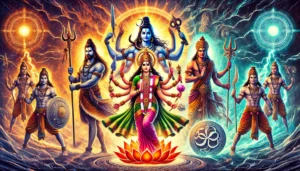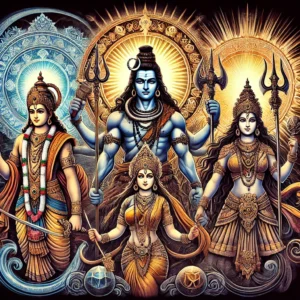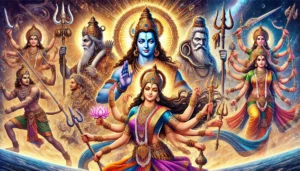
Symbolism of Hindu Gods & Their Weapons
Divine Symbols: The Hidden Meanings of Hindu Gods and Their Weapons
Hinduism, one of the world’s most ancient and profound spiritual traditions, is rich in symbolism. The gods and goddesses of Hinduism are often depicted with unique weapons, each carrying a deep philosophical and spiritual meaning. These divine weapons are not just instruments of battle but symbols of cosmic forces, virtues, and wisdom that guide humanity in its spiritual evolution.
From the mighty Sudarshana Chakra of Lord Vishnu to the fearsome Trishul of Lord Shiva, each weapon represents a divine quality essential for maintaining balance in the universe. This article delves into the significance of these celestial weapons, helping us understand their hidden meanings and their relevance in our own lives.
1. Lord Vishnu – The Preserver and His Divine Weapons
Lord Vishnu, the preserver of the universe, is known for maintaining balance and order. His weapons symbolize protection, righteousness, and the ability to restore harmony whenever adharma (unrighteousness) takes over.
Sudarshana Chakra – The Wheel of Time and Cosmic Justice
The Sudarshana Chakra is a spinning, fiery discus with 108 serrated edges. It represents:
- The power of time (Kala) that destroys all evil.
- The eternal cycle of creation and destruction.
- The divine vision and omnipresence of Vishnu, symbolizing his ability to see everything across time and space.
Kaumodaki Gada – The Mace of Power and Justice
The gada (mace) represents strength, power, and the authority to uphold dharma. It is a reminder that righteousness must be protected with force if necessary.
Sharanga Bow and Arrows – Mastery Over Desires
The Sharanga bow signifies control over material desires and disciplined action. Vishnu’s arrows symbolize focused energy, precision, and determination in upholding dharma.
2. Lord Shiva – The Destroyer and His Divine Weapons
Lord Shiva, the cosmic destroyer, wields weapons that symbolize his power over the universe, destruction of ignorance, and mastery of all aspects of existence.
Trishul (Trident) – The Supreme Balance
Shiva’s trident represents:
- Creation, Preservation, and Destruction – the three fundamental processes of the universe.
- Body, Mind, and Soul – the three aspects of being that one must balance for spiritual enlightenment.
- Sattva, Rajas, and Tamas – the three gunas (qualities of nature) that influence human behavior.
Pashupatastra – The Ultimate Weapon of Shiva
The Pashupatastra is one of the most powerful divine weapons, capable of total annihilation. It symbolizes the destruction of ignorance, arrogance, and negativity that bind the soul.
Damaru – The Sound of Creation
Shiva’s Damaru (small drum) produces cosmic vibrations, representing the sound Om—the origin of all creation. It symbolizes rhythm, cosmic order, and the cycle of life and death.
Khatvanga – The Staff of Liberation
Shiva sometimes carries the Khatvanga, a staff with a skull, symbolizing transcendence over death and detachment from the material world.

Symbolism of Hindu Gods & Their Weapons
Table of Contents
3. Goddess Durga – The Divine Warrior and Her Weapons
Goddess Durga is the embodiment of Shakti (divine feminine power). She carries multiple weapons, each gifted by different gods, symbolizing her supreme strength to combat evil.
Sword – Wisdom and Discrimination
Her sword represents the sharpness of intellect, cutting through illusion and ignorance.
Trishul – Mastery Over the Three Gunas
Like Shiva’s trident, her trishul signifies the ability to balance sattva (purity), rajas (passion), and tamas (darkness).
Bow and Arrow – Energy and Focus
Durga’s bow and arrow represent direction and focus in life, teaching us to channel our energy wisely.
Chakra – Universal Order
Her chakra signifies the eternal cosmic order and the destruction of evil forces.
Lotus – Spiritual Purity
Unlike her other weapons, the lotus represents purity and detachment, reminding devotees that they should remain untouched by worldly impurities.
4. Goddess Kali – The Fierce Protector and Her Weapons
Kali, the fearsome form of Durga, is the destroyer of demons and the protector of devotees. Her weapons symbolize the power of transformation and spiritual liberation.
Scimitar – Destruction of Ego
Kali’s scimitar represents the severance of ego and ignorance, leading to ultimate freedom.
Severed Head – Victory Over Maya
She holds a severed head, symbolizing the removal of false identity and the destruction of illusion (maya).
5. Lord Hanuman – The Devotee and His Divine Strength
Lord Hanuman, the ultimate devotee of Lord Rama, represents courage, humility, and devotion.
Gada (Mace) – Strength and Loyalty
Hanuman’s mace symbolizes his immense strength, loyalty, and ability to overcome any obstacle.
6. Lord Kartikeya – The Warrior God and His Spear
Lord Kartikeya, the son of Shiva and the commander of the divine army, is depicted with a Vel (divine spear).
Vel – Knowledge and Divine Power
The Vel pierces through ignorance and represents wisdom, bravery, and protection.

Symbolism of Hindu Gods & Their Weapons
7. Lord Rama – The Embodiment of Dharma and His Bow
Lord Rama, an incarnation of Vishnu, is always depicted with his Kodanda bow.
Kodanda Bow – Dharma and Righteousness
Rama’s bow represents his unwavering commitment to dharma (righteousness) and his readiness to uphold justice.
8. Lord Krishna – The Supreme Teacher and His Flute
Although Lord Krishna is a warrior, his most iconic weapon is not a conventional weapon but his bansuri (flute).
Bansuri – Divine Music and Attraction
Krishna’s flute symbolizes divine love, harmony, and the soul’s attraction toward God. The sound of his flute calls devotees to surrender to the divine will.
Conclusion – The Spiritual Meaning of Divine Weapons
The weapons of Hindu gods are not mere instruments of battle; they are symbols of divine power, wisdom, and protection. They remind devotees of the eternal battle between good and evil, both in the world and within themselves.
- Vishnu’s weapons teach us to preserve righteousness.
- Shiva’s weapons remind us of destruction as a necessary step for renewal.
- Durga’s weapons inspire courage and inner strength.
- Kali’s symbols emphasize liberation from ego and illusion.
- Hanuman and Kartikeya’s weapons represent devotion and fearlessness.
- Krishna’s flute symbolizes divine love and the ultimate surrender to the cosmic will.
Understanding these symbols allows us to apply their lessons in our daily lives—using wisdom to overcome ignorance, strength to defeat negativity, and devotion to stay on the path of righteousness.
May the divine weapons of the gods empower us to conquer our inner demons and lead us toward spiritual enlightenment!
FAQs on the symbolism of Hindu gods and their weapons:
- Why do Hindu gods carry weapons?
Hindu gods carry weapons not for violence but as symbols of their divine powers, protection, and cosmic duties. Each weapon represents a deeper philosophical or spiritual meaning.
- What does Lord Vishnu’s Sudarshan Chakra symbolize?
The Sudarshan Chakra represents the destruction of evil and protection of righteousness (Dharma). It signifies time (Kala) and divine justice.
- What is the significance of Lord Shiva’s Trishul (trident)?
Shiva’s Trishul symbolizes control over the three gunas—Sattva (purity), Rajas (passion), and Tamas (ignorance). It also represents destruction, creation, and preservation.
- Why does Goddess Durga carry multiple weapons?
Durga’s multiple weapons, given by various gods, symbolize her supreme power and ability to destroy different forms of evil. They also represent the strength of divine unity.
- What does Lord Rama’s bow represent?
Lord Rama’s bow, Kodanda, symbolizes his unwavering commitment to Dharma and his ability to uphold justice with strength and righteousness.
- Why does Lord Ganesha hold an axe?
Ganesha’s axe (Parashu) signifies cutting off attachments and ignorance, helping devotees overcome obstacles in life.
- What is the meaning of Lord Kartikeya’s Vel (spear)?
The Vel represents wisdom, victory, and divine knowledge. It was gifted by Goddess Parvati to destroy evil forces like Tarakasura.
- What does Lord Indra’s Vajra (thunderbolt) symbolize?
The Vajra signifies indestructible spiritual power, courage, and strength, representing the ability to overcome challenges with determination.
- Why is Lord Hanuman depicted carrying a mace (Gada)?
The Gada symbolizes immense strength, loyalty, and devotion. It represents Hanuman’s power and ability to protect devotees from harm.
- How can devotees apply these symbols in daily life?
Understanding these symbols helps devotees cultivate virtues like courage, wisdom, and righteousness. They serve as reminders to overcome negativity and follow Dharma.
Summary
Symbolism of Hindu Gods & Their Weapons
Hindu mythology is rich with symbolism, where every god and goddess carries divine weapons that serve as extensions of their cosmic powers. These weapons are not just tools of warfare but embody deeper spiritual meanings, representing virtues, energies, and the eternal struggle between dharma (righteousness) and adharma (unrighteousness).
- Lord Vishnu – The Preserver
- Sudarshan Chakra (Divine Discus): This spinning disc, capable of annihilating evil, represents time, righteousness, and the cycle of creation and destruction. It is a reminder that justice will always prevail.
- Kaumodaki (Mace): Symbolizing strength and knowledge, the mace is a representation of Vishnu’s power to destroy ignorance and uphold dharma.
- Panchajanya (Conch): The sound of this conch signifies cosmic truth, awakening, and the beginning of righteousness.
2. Lord Shiva – The Destroyer
- Trishul (Trident): The three prongs of Shiva’s trident represent the three gunas—sattva (purity), rajas (passion), and tamas (ignorance). It also symbolizes mastery over creation, preservation, and destruction.
- Damaru (Drum): Though not a weapon, the damaru symbolizes rhythm and the cosmic sound (‘Om’), which creates and sustains the universe.
3. Goddess Durga – The Divine Protector
Durga, the fierce warrior goddess, carries multiple weapons gifted by various gods:
- Trishul (from Shiva): Symbol of divine balance.
- Sudarshan Chakra (from Vishnu): Represents time and righteousness.
- Bow and Arrow (from Vayu and Surya): Symbolizes energy and direction in battle.
- Sword (from Kala/Brahma): Stands for knowledge and the sharpness of intellect.
- Vajra (from Indra): Represents unshakable determination and power.
Each of her weapons signifies a unique aspect of divine power required to vanquish evil forces.
- Lord Indra – The King of Devas
- Vajra (Thunderbolt): Created from Sage Dadhichi’s bones, the Vajra is a symbol of invincibility, courage, and divine strength. It represents the indestructible force of truth and righteousness.
5. Lord Kartikeya – The God of War
- Vel (Spear): This divine spear, given by Goddess Parvati, symbolizes wisdom, precision, and the ability to cut through ignorance.
6. Lord Hanuman – The Symbol of Devotion
- Gada (Mace): Hanuman’s mace symbolizes immense strength, devotion, and selfless service to Lord Rama and the greater good.
Spiritual Significance
Beyond physical combat, these divine weapons carry moral and philosophical lessons. They remind devotees of the virtues needed to combat internal and external adversities—be it ignorance, ego, or injustice. They reinforce the idea that true strength lies in wisdom, righteousness, and unwavering faith in the divine.
By understanding the deeper symbolism of Hindu gods and their weapons, we gain insights into the universal principles of life, duty, and the ultimate victory of good over evil.
Unlock the Ancient Wisdom of Sanatan Dharma – Join Us on YouTube!
👉 Subscribe now to Prachin Sanatan Dharma and embark on a journey of enlightenment.
Explore timeless teachings, spiritual insights, and cultural richness on our YouTube channel, Prachin Sanatan Dharma. Dive deep into the essence of Sanatan Dharma through captivating videos that inspire and educate.
Related Articles
- Restful Nights: Ayurvedic Remedies and Traditional Indian Practices to Overcome Insomnia and Late-Night Habits
- The Tridevi: Lakshmi, Saraswati, and Parvati – Their Roles and Powers
- “Divine Creatures of Ancient Indian Scriptures: Exploring the Role of Animals in the Vedas, Puranas, and Mahabharata”
- Nature and Spirituality: Exploring the Sacred Essence of the Himalayas, Ganga, and Other Natural Wonders”
- “Reviving the Gurukul System: Relevance and Lessons for Modern Education”
- “Exploring Greek and Indian Mythology: Similarities Between Greek and Indian Mythology “
- “Embracing Sattvic Living: Harmonizing Mind, Body, and Soul Through Food and Lifestyle”
- “Charity and Prosperity: Exploring the Concept of Daan and Its Financial Relevance in Modern Life”
- How to Build an Eco-Friendly Home Inspired by Vastu Shastra
- Comparison of Ancient and Modern Sports: How Traditional Sports Have Influenced Contemporary Games
- “Timeless Lessons from Ancient Tales: Linking Samudra Manthan and Ganga’s Descent to Modern Ecological Challenges”
- “Reviving Sanskrit: How AI is Preserving Ancient Languages for the Future”
- “Mathura: The Sacred Land of Lord Krishna’s Divine Leelas”
- Investing for Future Generations: Lessons from Indian Traditions on Legacy Building and Wealth Preservation
- “Ancient Indian Wisdom: Timeless Lessons for Tackling Today’s Climate Crisis”
- “Artificial Intelligence and Spirituality: Transforming Ancient Practices for the Modern World”
- “Gold and Real Estate in India: Timeless Assets Shaping Financial Strategies”
- Tradition Meets Innovation: The Evolution of Technology in Hindu Rituals
- End-of-World Myths: Exploring Kali Yuga in Hinduism and Ragnarök in Norse Mythology
- Garuda, Pegasus, and Dragons: The Universal Ties of Mythical Beasts Across Cultures
- “Ancient Vimanas: Mythical Flying Machines or Evidence of Advanced Technology?”
- Time Travel in Hindu Mythology: The Fascinating Tales of Kakudmi and King Raivata
- “Divine Feminine Power in Hindu Mythology: The Legends of Durga, Saraswati, and Lakshmi”
- “Divine Beings of Sanatan Dharma: The Spiritual Significance of Sacred Animals in Hinduism”
- “Symbolism in Mythological Art: Unlocking Hidden Meanings in Ancient Temple Carvings”
- “Exploring Technological Advancements in Ancient India and Civilizations: Vimana, Metallurgy, & Water Management systems”
- Unveiling the Mysteries: Ancient Temples of Sanatan Dharma , Mysterious Temples of India
- “The Scientific Knowledge of Sanatan Dharma: Ancient Wisdom Meets Modern Science”
- Ancient Indian Sports and Games: Celebrating a Legacy of Skill, Strength & Strategy”
- “Exploring the Cosmic Link: The Connection Between Astronomy and Vedic Astrology”
- The Power of Sanskrit: Unlocking the Divine Language of the Gods
- “The End of Kaliyuga: A Sanatan Insight into the World’s Final Chapter”
- Explore more articles on Prachin Sanatan Yuga.
Symbolism of Hindu Gods & Their Weapons Symbolism of Hindu Gods & Their Weapons Symbolism of Hindu Gods & Their Weapons Symbolism of Hindu Gods & Their Weapons Symbolism of Hindu Gods & Their Weapons Symbolism of Hindu Gods & Their Weapons Symbolism of Hindu Gods & Their Weapons Symbolism of Hindu Gods & Their Weapons Symbolism of Hindu Gods & Their Weapons Symbolism of Hindu Gods & Their Weapons
Symbolism of Hindu Gods & Their Weapons Symbolism of Hindu Gods & Their Weapons Symbolism of Hindu Gods & Their Weapons Symbolism of Hindu Gods & Their Weapons Symbolism of Hindu Gods & Their Weapons Symbolism of Hindu Gods & Their Weapons Symbolism of Hindu Gods & Their Weapons Symbolism of Hindu Gods & Their Weapons Symbolism of Hindu Gods & Their Weapons Symbolism of Hindu Gods & Their Weapons
Symbolism of Hindu Gods & Their Weapons Symbolism of Hindu Gods & Their Weapons Symbolism of Hindu Gods & Their Weapons Symbolism of Hindu Gods & Their Weapons Symbolism of Hindu Gods & Their Weapons Symbolism of Hindu Gods & Their Weapons Symbolism of Hindu Gods & Their Weapons Symbolism of Hindu Gods & Their Weapons Symbolism of Hindu Gods & Their Weapons Symbolism of Hindu Gods & Their Weapons
Symbolism of Hindu Gods & Their Weapons Symbolism of Hindu Gods & Their Weapons Symbolism of Hindu Gods & Their Weapons Symbolism of Hindu Gods & Their Weapons Symbolism of Hindu Gods & Their Weapons Symbolism of Hindu Gods & Their Weapons Symbolism of Hindu Gods & Their Weapons Symbolism of Hindu Gods & Their Weapons Symbolism of Hindu Gods & Their Weapons Symbolism of Hindu Gods & Their Weapons
